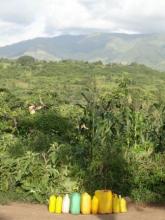Domestic-plus
Poor people in developing countries need water for many purposes: for drinking, bathing, irrigating vegetable gardens, and watering livestock. However, responsibility for water services is divided between different government agencies, the WASH (Water, Sanitation and Hygiene) and irrigation sub-sectors, with the result that people's holistic needs are not met. Multiple use water services (MUS) is a participatory water services approach that takes account of poor people's multiple water needs as a starting point of planning, and the approach has been implemented in at least 22 countries in Africa, Asia and Latin America. Scaling up Multiple Use Water Services argues that by designing cost-effective multi-purpose infrastructure MUS can have a positive impact on people's health and livelihoods. It analyses and explains the success factors of MUS, using a framework of accountability for public service delivery, and it also examines why there has been resistance against scaling up MUS. A stronger service delivery approach can overcome this resistance, by rewarding more livelihood outcomes, by fostering discretionary decision-making power of local-level staff and by allowing horizontal coordination.This book should be read by government and aid agency policy makers in the WASH and agriculture sectors, by development field workers, and by academics, researchers and students of international development.
There is growing evidence that rural and peri-urban households depend on water not only for basic domestic needs but also for a wide variety of livelihood activities. In recognition of this reality, an alternative approach to water service planning, known as multiple-use water services (MUS), has emerged to design water services around householdsʼ multiple water needs. The benefits of MUS are diverse and include improved health, food security, income generation, and women’s empowerment. A common argument put forth by WASH sector professionals in favour of upgrading existing water systems is that productive water uses allow for income generation that, in turn, enhances the ability to pay for services. However, there has been limited rigorous research to assess whether the additional income generated from productive use activities justifies water service upgrading costs. This paper describes an income-cost (I-C) analysis based on survey data and EPANET models for 47 domestic-plus water systems in rural Senegal to assess whether the theoretical financial benefits to households from additional piped-water-based productive activities would be greater than the estimated system upgrade costs. The paper provides a transparent methodology for performing an I-C analysis. We find that the potential incremental income earned by upgrading the existing domestic-plus systems to provide intermediate-level MUS would be equivalent to the funds needed to recover the system upgrade costs in just over one year. Thus, hypothetically, water could pay for water. A sensitivity analysis shows that even with a 55% reduction in household income earned per cubic meter of water, the incremental income is still greater than the upgrade costs over a ten-year period for the majority of the systems.
The Millennium Water Alliance Ethiopia Programme (MWA-EP) has experimented with the Multiple Use water Services (MUS) approach to improve water and food security.
With support from the RAIN initiative, Water Action and Millennium Water Alliance, with technical support from Catholic Relief Services (CRS) Ethiopia, extended projects to supply water for productive as well as domestic uses in Kalu woreda. This case study examines how the Multiple Use water Services (MUS) approach was applied in Kalu to develop joint domestic water supply and irrigation schemes.
With support from the RAIN initiative and Millennium Water Alliance, the Ethiopian Evangelical Church Mekane Yesus (EECMY) and WaterAid Ethiopia have been working with governments and communities to enhance traditional water supply interventions. The objective was to increase both water and food security. This case study examines how a productive element was added to community water supply.
ABSTRACT:
Over the past decade there has been a growing interest in the potential benefits related to the productive use of rural piped water around the homestead. However, there is limited empirical research on the extent to which, and conditions under which, this activity occurs. Using data obtained from a comprehensive study of 47 rural piped water systems in Senegal, this paper reveals the extent of piped-water-based productive activity occurring and identifies important system-level variables associated with this activity. Three-quarters (74%) of the households surveyed depend on water for their livelihoods with around one-half (54%) relying on piped water. High levels of piped-water-based productive activity were found to be associated with shorter distances from a community to a city or paved road (i.e. markets), more capable water system operators and water committees, and communities that contributed to the construction of the piped water system. Further, access to electricity was associated with higher productive incomes from water-based productive activities, highlighting the role that non-water-related inputs have on the extent of productive activities undertaken. Finally, an analysis of the technical performance of piped water systems found no statistically significant association between high vs. low levels of productive activity and system performance; however, a positive relationship was found between system performance and the percentage of households engaged in productive activities.
Zambia has invested substantially in rural water supply since the early 1970s, but the actual number of people effectively provided with safe drinking water remains very low. It is estimated that only 37% of the population had access to safe water supply in 2000, a deprivation that has characterised and entrenched poverty in Zambia’s rural areas. Attempts to alleviate this poverty require a policy that favours a shift in emphasis from provision of safe water supplies to that encompassing productive water. The latter enables families to increase income and reduce costs of healthcare services for water-related illnesses. Gains in income generation will further enable communities to take care of their safe water needs, addressing the systematic challenge of sustainability in the delivery of rural water supply programmes. Under such favourable conditions rural communities can enjoy a life of quality and dignity.
Both water and sanitation and food are recognised as human rights, that every citizen is entitled to enjoy. Our professions, governments and agencies work diligently, but mostly separately on these two issues. In some places, such a clear separation of efforts is not always possible or sensible though. Water and food are especially closely linked in rural and peri-urban areas in low income countries, and here, efforts to improve access to water and food security demand integrated components that build on the potential synergies. Families integrate their own efforts after all, and many traditional water supplies schemes cater for multiple uses. To maximize the developmental impact of their work, this is something that professionals and organisations need to get better at too. This article highlights one the productive use of domestic water supplies where such a coordinated approach is required, and illustrates it by case studies from Ethiopia.
This scoping study offers implementable recommendations for investment opportunities in multiple use water services in Ghana. The report is based on an assessment of existing MUS modalities and innovations, potential for implementation and possible barriers. The study shows that MUS is a de facto practice both in formal domestic and irrigation service delivery, complemented by self-supply initiatives. Moving from de facto multiple use practices to a more planned and structured MUS approach can be done from various entry-points. Based on risk assessments, this study concludes that domestic-plus, rehabilitation of small reservoirs and self-supply for irrigation present the best direct investment opportunities for maximum impact.


